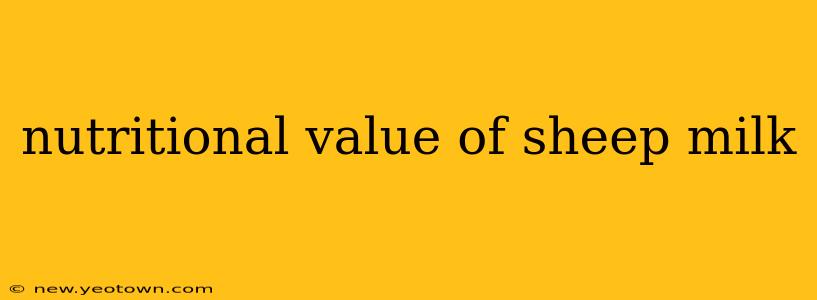The Nutritional Powerhouse: Unveiling the Nutritional Value of Sheep Milk
For centuries, sheep milk has been a culinary staple and a source of nourishment in many parts of the world. Often overshadowed by cow's milk, sheep milk quietly boasts a remarkable nutritional profile that deserves recognition. It's a creamy, rich delight, but beyond its delicious taste lies a treasure trove of health benefits stemming from its unique composition. Let's delve into the world of sheep milk and discover why it's gaining popularity as a nutritional powerhouse.
What makes sheep milk nutritionally superior to cow's milk?
This is a common question, and the answer isn't a simple "better than." It's more accurate to say that sheep milk offers a different nutritional profile with certain advantages. Compared to cow's milk, sheep milk generally contains:
-
Higher fat content: This translates to a richer, creamier texture and a higher caloric density. The fat is also composed of different fatty acids, including a higher proportion of medium-chain triglycerides (MCTs), which are known for their easier digestibility and potential energy benefits.
-
More protein: Sheep milk often packs a greater amount of protein than cow's milk, essential for building and repairing tissues.
-
Higher levels of certain vitamins and minerals: Sheep milk frequently boasts higher concentrations of calcium, phosphorus, potassium, and various B vitamins. These nutrients are vital for bone health, energy production, and overall bodily functions.
-
Different lactose structure: While still containing lactose, sheep milk's lactose structure might be slightly easier for some individuals with lactose intolerance to digest. However, it's crucial to remember that lactose intolerance varies greatly from person to person.
What are the key nutrients found in sheep milk?
Sheep milk is a nutritional goldmine, brimming with essential vitamins and minerals. Let's break down some of the key players:
-
Protein: Crucial for building and repairing tissues, vital for growth and development.
-
Fat: Provides energy and supports hormone production. The specific fatty acid composition contributes to its unique nutritional profile.
-
Calcium: Essential for strong bones and teeth.
-
Phosphorus: Works in tandem with calcium for bone health and various other bodily functions.
-
Potassium: Important for maintaining fluid balance and nerve function.
-
Riboflavin (B2): Plays a vital role in energy metabolism.
-
Vitamin B12: Essential for nerve function and red blood cell formation.
Is sheep milk good for people with lactose intolerance?
This is a complex issue. While sheep milk might be easier to digest for some individuals with mild lactose intolerance due to its slightly different lactose structure, it's not a guaranteed solution. The severity of lactose intolerance varies greatly, and some individuals may still experience digestive discomfort even with sheep milk. If you have lactose intolerance, it's always best to consult with a healthcare professional or registered dietitian before incorporating sheep milk into your diet.
What are the health benefits of consuming sheep milk?
The rich nutritional profile of sheep milk contributes to a range of potential health benefits, including:
-
Improved bone health: The high calcium and phosphorus content supports strong bones and reduces the risk of osteoporosis.
-
Increased energy levels: The higher fat and protein content provide sustained energy.
-
Enhanced immune function: The various vitamins and minerals contribute to a healthy immune system.
-
Improved digestion (for some): Some individuals find sheep milk easier to digest than cow's milk.
-
Better nutrient absorption: Certain nutrients in sheep milk may be more easily absorbed by the body.
How does the nutritional value of sheep milk compare to goat milk and cow's milk?
All three – sheep, goat, and cow's milk – offer distinct nutritional profiles. While sheep milk often surpasses cow's milk in fat and protein content, goat milk is known for its easy digestibility. The best choice depends on individual needs and preferences. The differences are subtle, and each offers unique advantages.
Can sheep milk be part of a healthy diet?
Absolutely! Sheep milk can be a valuable addition to a balanced diet, offering a rich source of nutrients. However, moderation is key, as it is higher in calories and fat compared to some other dairy options. Incorporating sheep milk into a healthy lifestyle should be done thoughtfully, considering individual dietary needs and preferences. It's not a magic bullet, but a nutritious component within a balanced whole-foods approach.

